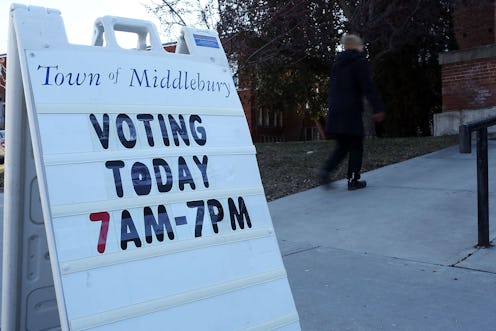News
Why The Most Liberal State In The Country Has Never Had A Woman In Congress

In many ways, Vermont is a liberal oasis. Self-described democratic socialist Bernie Sanders has represented the state in Congress for 27 years; women don't face restrictions when seeking an abortion; and weed was legalized there earlier this year. But this small, left-leaning New England state has fallen well behind the rest of the country in one area: it has yet to have a woman represent it in the U.S. House or Senate. Why Vermont has never sent a woman to Congress can't be entirely explained by straight-up sexism, either.
"It's not a thing to be proud of," Bert Johnson, associate professor of political science and department chair at Middlebury College, tells Bustle of his state's lack of female representation in Washington.
Gallup data published in February lists Vermont and Massachusetts as the most liberal states in the nation, with liberals outnumbering conservatives by double-digit margins. Yet Vermont shared the distinction of being one of the last holdouts never to send a woman to Congress with Mississippi, one of the nation's most conservative states — until last week, when Mississippi Gov. Phil Bryant announced he was appointing his agriculture commissioner, Cindy Hyde-Smith, to replace retiring Sen. Thad Cochran.
It's true that Vermont has fewer opportunities to elect women, since it has just one seat in the House of Representatives and two in the Senate. But the same is true of Alaska, Delaware, Montana, North Dakota, South Dakota, and Wyoming, all of which have sent at least one woman to Capitol Hill already. Experts say Vermont's lack of diversity in Congress can largely be attributed to the power of the state's incumbents.
"The senators particularly are people that have been in politics for the last 40 years pretty much, and they've just got the power of incumbency behind them," Johnson tells Bustle. "So it's just difficult for there to be an opening until someone retires or gets elected to higher office."
Sanders, Sen. Patrick Leahy, and Rep. Peter Welch have all held their seats in Congress for more than a decade. Leahy joined the Senate in 1975 and is the currently the most senior member there. And with these popular Democratic incumbents continuously running for re-election, it's almost impossible for newcomers to break in.
Ruth Hardy recruits and trains women to run for office in her role as executive director of Emerge Vermont, and understands the unique struggle Vermont faces in sending a woman to Washington. None of Vermont's representatives have been accused of sexual harassment or pushed an anti-abortion agenda, unlike some other congressional Democrats who've recently been forced to resign or drew a female primary challenger. As a progressive Democrat, Hardy thinks the state's all-male congressional delegation has done a great job.
Vermont's three-person congressional delegation also gives these incumbents' seniority more power than they might otherwise hold. "To have somebody who has so many years of seniority and therefore is able to have a larger role in the Senate or the House is compelling for a lot of people," Hardy says. But she adds, "there's a lot to be said for seniority, but there's as much, if not more, to be said for diverse representation."
No women are attempting to challenge Vermont's incumbents this year, although a few men are running against the longtime members of Congress. Hardy and Johnson expect to see more women throw their hats in the ring whenever Sanders, Leahy, or Welch decides not to seek re-election.
Vermont seems especially far behind in terms of female representation at the federal level when compared to its eastern neighbor. New Hampshire's four-person congressional delegation is made up entirely of women. But unlike Vermont, New Hampshire has seen more turnover recently: its two Democratic senators, Jeanne Shaheen and Maggie Hassan, were elected in 2008 and 2016, respectively. New Hampshire elections are also more competitive between parties. Hassan beat Republican incumbent Kelly Ayotte in 2016, who also happened to be a woman.
There's a lack of Vermont women in public office at the state level, too. Currently, there is just one woman in statewide office and one female mayor. Vermont's first and only woman governor, Madeleine Kunin, left the governor's mansion in 1991.
Hardy and Johnson don't think Vermont women face more obstacles than women candidates in other states, however. "Women in general have a hard time winning executive positions," Hardy says.
There's one area where Vermont actually is leading most of the nation in gender representation: its state legislature. Currently, 40 percent of Vermont's General Assembly seats are held by women, tied for first with Arizona. And 50 percent of Vermont's Assembly leadership positions belong to women. So, Hardy says the problem isn't recruiting women to run.
"I can think of literally 20 women who could step up and run a really great race for Congress," Hardy says. "[But] we also have a lot of men who are waiting to run for Congress... so when one of these seats opens up, I think it's going to be hugely contested."
Nevertheless, Hardy says she hopes the state embraces the opportunity to elect a woman — since it has yet to do so — whenever that time comes.